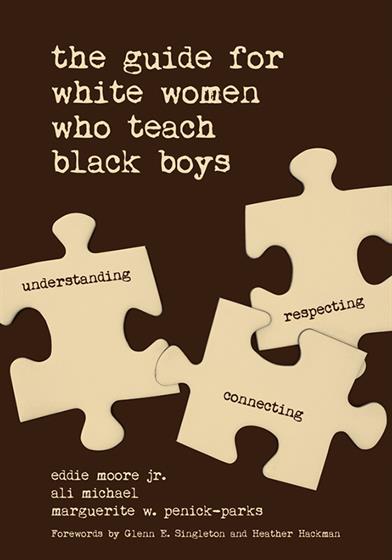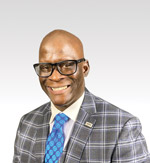FOREWORDS
ACKNOWLEDGMENTS
ABOUT THE AUTHORS
ABOUT THE CONTRIBUTORS
INTRODUCTION: WELCOME TO THE GUIDE FOR WHITE WOMEN WHO TEACH BLACK BOYS
UNDERSTANDING
Part 1: Exploring the Self
1. READY TO MAKE A DIFFERENCE, THE OLD-FASHIONED WAY
Vignette: Raisins in the Sun: White Teacher as a Force of Nature Buffering the Radiation of Racial Retaliation
2. THE STATE OF THE WHITE WOMAN TEACHER
3. ADVANCING THE SUCCESS OF BOYS AND MEN OF COLOR
Vignette: Two Black Boys
4. UNDERSTANDING UNCONSCIOUS BIAS AS ONE MORE TOOL IN THE COMMITTED WHITE TEACHER’S EQUITY TOOLKIT
5. WHITE FEMALE TEACHERS AND BLACK BOYS: RIGHT TEACHERS AND (MIS)UNDERSTOOD BOYS
6. WHITE RACIAL IDENTITY DEVELOPMENT
7. WHAT IF BEING CALLED RACIST IS THE BEGINNING, NOT THE END, OF THE CONVERSATION?
Vignette: New Understandings
8. WHAT DOES IT MEAN TO BE A WHITE TEACHER?
Part 2: Understanding the Constraints and Challenging the Narratives About Who Black Boys Are and Who White Women Can Be
9. RESPECTING BLACK BOYS AND THEIR HISTORY
10. “I CAN SWITCH MY LANGUAGE, BUT I CAN’T SWITCH MY SKIN”: WHAT TEACHERS MUST UNDERSTAND ABOUT LINGUISTIC RACISM
Vignette: The Color of Poop
11. IDENTITY SAFETY AS AN ANTIDOTE TO STEREOTYPE THREAT
12. THE SCIENCE BEHIND PSYCHOLOGICAL VERVE AND WHAT IT MEANS FOR BLACK STUDENTS
13. THE VISIT
14. REWRITING THE NARRATIVE
Vignette: Slavery’s Archetypes Affect White Women Teachers
15. “DON’T LEAN—JUMP IN”: THE FIERCE URGENCY TO CONFRONT, DISMANTLE, AND (RE)WRITE THE HISTORICAL NARRATIVE OF BLACK BOYS IN EDUCATIONAL INSTITUTIONS
RESPECTING
Part 3: Respecting the Broad Diversity of Black Boys’ Experiences and Identities
Vignette: Prince Taught Me the Redefinition of Black Masculinity
16. STRATEGIES FOR SHOWING LOVE TO BLACK BOYS
17. WHITE PRIVILEGE AND BLACK EXCELLENCE: TWO TERMS I’VE BEEN “AFRAID” OF FOR MUCH OF MY LIFE
18. BLACK BOYS AND THEIR RACIAL IDENTITY: LEARNING HOW THEY FIT INTO SOCIETY AND IN YOUR CLASSROOM
Vignette: I Had a Right
19. TEACHING BLACK BOYS DURING CHILDHOOD: A COUNTERNARRATIVE AND CONSIDERATIONS
Vignette: Being Black and Deaf Is a Double Stigma
20. “HOW DARE YOU MAKE THIS ABOUT RACE?!”: CENTERING RACE, GENDER, AND POVERTY
21. THE N!GGA(ER) IN ME
Vignette: Die N-word Die
22. BLACKNESS/TRANSNESS: TWO TARGETS ON MY BACK
Vignette: What Educators Can Do to Support Trans Students
23. WHITE TEACHERS AND THE POWER TO TRANSFORM: EARLY CHILDHOOD EDUCATORS AND THE POTENTIAL FOR LASTING HARM
Vignette: Brown Mothers, White Children
24. LEARN ABOUT US BEFORE YOU TEACH (ABOUT) US: QUEER BLACK BOYS
25. BLACK MALE STUDENTS AND TEACHERS IN K–12 CLASSROOMS: STRATEGIES FOR SUPPORT TO INCREASE PERFORMANCE AS STUDENTS AND PROFESSIONALS
Vignette: The Administrative Assistant Staff Member: Oh, and Black!
Part 4: Relationships With Parents, Colleagues, and Community
26. HELPING AMAZING BLACK BOYS BECOME AMAZING BLACK MEN
27. CONNECTING WITH BLACK STUDENTS AND PARENTS: EQUAL VISION
Vignette: Being a Black Mom of Black Boys
28. ACTIVATING INCLUSIVENESS
29. BELIEF, PEDAGOGY, AND PRACTICE: STRATEGIES FOR BUILDING POWERFUL CLASSROOM COMMUNITIES
Vignette: The Symbolic Teacher
30. RUMINATIONS FROM THE INTERSECTIONS OF A #BLACKMOMMYACTIVIST
Vignette: Discipline Practices of Caribbean Families
31. FIND FREEDOM IN THE CLASSROOM: A LOVE LETTER TO MY BABIES’ TEACHERS
CONNECTING
Part 5: Connecting Student Success and Failure to School Structures and Classroom Strategies
32. START OUT FIRM
33. A PARABLE OF ACADEMIC MISGIVINGS: THE EDUCATOR’S ROLE IN ADDRESSING COLLEGE UNDERMATCH
Vignette: Nonviolence, Violence, Standing Up
34. THE COLLUSION OF SOCIAL NORMS AND WORKING WITH INTERRACIAL FAMILIES
35. WHAT ARE WE DOING TO SUPPORT “THESE” STUDENTS TO MEET THEIR POTENTIAL? STRATEGIES FOR CREATING EQUITABLE CLASSROOMS
Vignette: Dismantling the “White Savior Mentality”
36. INTERRUPTING SCHOOL STRUCTURES: ADD/ADHD OVERIDENTIFICATION AND HOW BLACK CULTURAL STYLES ARE OFTEN CONFUSED FOR ADD
37. FOOTBALL, SPORTS, AND MOORE - USING SCHOOL STRUCTURES TO GET MORE OUT OF BLACK BOYS
Part 6: Connecting Student Success to School Structures and Classroom Strategies
Vignette: How Do Black Lives Matter in Your Curriculum?
38. STRATEGIES THAT DE-ESCALATE CONFLICT IN THE CLASSROOM
39. MEETING STUDENTS WHERE THEY ARE: PROJECT-BASED LEARNING AND CRITICAL THINKING SKILLS
40. BLACK FACES AND WHITE SPACES: RECOGNIZING AND SUPPORTING BLACK BOYS IN GIFTED EDUCATION
41. THE BOOK MATTERS: USING THE COLOR-CODED BLOOM-BANKS MATRIX TO SUPPORT THE LITERACY AND ENGAGEMENT OF BLACK BOYS
42. BOOKS AND CURRICULUM: WHAT TO READ WITH BLACK MALES IN ELEMENTARY SCHOOL TO CREATE A STRONG FOUNDATION OF POSITIVE RACIAL IDENTITY DEVELOPMENT
43. GLOBAL SKILLS: BEYOND THE CLASSROOM AND THE PLAYGROUND
OUTTRO: REMEMBER, BLACK GIRLS AREN’T DOING “JUST FINE”: SUPPORTING BLACK GIRLS IN THE CLASSROOM
VIDEO RESOURCES
REFERENCES
INDEX




